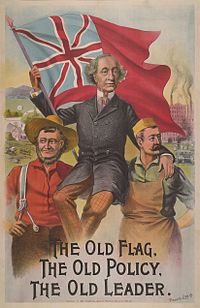
Photo from wikipedia
By employing individual-level data on MPs in 15 countries and 73 national and local assemblies, this article examines the conditions under which individual MPs are responsive to interest organizations. We… Click to show full abstract
By employing individual-level data on MPs in 15 countries and 73 national and local assemblies, this article examines the conditions under which individual MPs are responsive to interest organizations. We show that MPs’ political values influence their responsiveness: MPs with more egalitarian and socially open values are more responsive to interest organizations. Moreover, MPs’ conceptions of democracy also matter in that more negative views of popular political involvement in democratic decision making are linked to lower responsiveness to interest organizations. Reliance on established ties with groups in society as well as support for technocracy have differential effects for responsiveness toward “old” and “new” interest organizations characterized by diverse social bases. These findings have important implications for democratic practice since they show how MPs are not all equally responsive to organized citizens as well as how different types of factors matter for responsiveness to “old” and “new” types of interest organizations.
Journal Title: Political Studies
Year Published: 2019
Link to full text (if available)
Share on Social Media: Sign Up to like & get
recommendations!